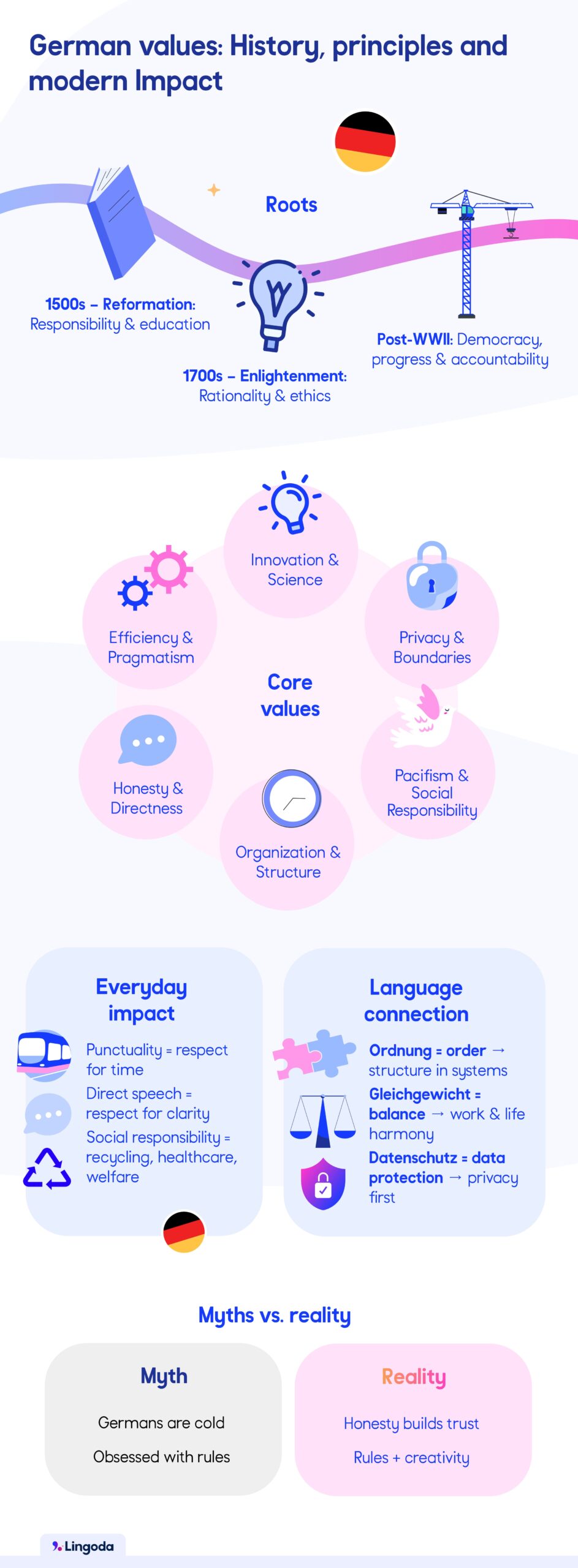German values: What they are, why they matter and how they shape modern Germany
When people think of German values, punctual trains and efficient recycling often come to mind. But values in Germany extend beyond mere stereotypes.

They’re deeply connected to history, politics and daily social life, shaping how people work, socialize and even communicate. From respect for rules and privacy to an emphasis on honesty and community, these values aren’t just cultural quirks; they’re the foundation of modern German society.
In this article, we’ll define what German values really are. Along the way, we’ll explore where they come from, how they influence daily life, and why understanding them can make learning the German language a richer experience.
- What are German values and why are they important?
- The historical roots of German beliefs
- Key values that define German society
- How understanding German values helps you learn the language
- Common misconceptions about German culture
- FAQs
What are German values and why are they important?
When we talk about values in the cultural sense, we mean the shared principles that guide how people act, interact and make decisions. Collectively, they’re a kind of invisible rulebook that shapes daily life.
In Germany, values like punctuality, honesty and respect for rules aren’t just ideals; they show up in everyday behavior. Arriving late to a meeting, for example, is more than a small slip-up — it’s seen as disrespectful to others’ time. Similarly, direct speech isn’t considered rude but rather a sign of clarity and respect.
For language learners, these cultural cues matter. Students often discover that understanding cultural values helps them understand the hidden meaning behind certain words, tones or expressions. Mastering both the language and the underlying values means you don’t just speak German — you sound German.
The historical roots of German beliefs
German values didn’t appear out of nowhere. Centuries of upheaval, reform and renewal shaped them. The Protestant Reformation, ignited by Martin Luther in the early 16th century, emphasized individual responsibility, education and a personal relationship with spiritual truths. And hundreds of years later, the Enlightenment brought thinkers such as the German philosopher Immanuel Kant, who made rationality, duty and ethics central to cultural life.
Philosophy has always played an outsized role in Germany. From Hegel to Nietzsche, big ideas about freedom, morality and society trickled down into how people saw themselves and their communities.
Fast forward to the 20th century: after the devastation of World War II, Germany’s reconstruction required not only material rebuilding but also moral renewal. The idea of Fortschritt (progress) became part of German national identity — a determination to move forward, embrace democracy and create stability.
These influences explain why modern German values continue to stress accountability, collective effort and forward momentum.

Learn German with Lingoda
How it works

Key values that define modern German society
Pragmatism and efficiency
Germans have little patience for empty promises. The cultural mantra could be summed up as: Say what you can do, and do what you say. Precision is admired not only in engineering, but also in everyday interactions. In schools and workplaces, clear expectations matter more than flowery language. That’s why “efficiency” isn’t just a buzzword — it’s a social virtue.
Innovation, science and research
Germany is globally respected for its Wissenschaft (science) and Forschung (research). Curiosity (Neugier) isn’t just encouraged, it’s institutionalized — think of the country’s strong universities, research institutes and world-class industries. This commitment to discovery has everything to do with Germany’s economic strength and reputation as an innovation powerhouse.
Privacy and personal boundaries
Oversharing is not a German pastime. While Germans are no strangers to friendliness, they balance it with a healthy respect for privacy. Don’t be surprised if neighbors remain polite but reserved for months. In the workplace, small talk tends to be short, sweet and purposeful. Personal questions come much later, if at all.
Honesty and directness
Germans say what they mean, often in ways outsiders might find blunt. But this isn’t rudeness; it’s respect. Clear, direct communication avoids confusion and builds trust. If someone critiques your work, it’s probably not personal — it’s cultural.
Organization and structure
Pünktlichkeit (punctuality) is about more than being “on time.” It reflects a deeper belief in structure, respect for others’ schedules, and the smooth functioning of systems. From public transport timetables to carefully planned agendas, structure is what makes society reliable.
Pacifism and social responsibility
Post-WWII reconstruction reshaped Germany into a society that values peace, equality and collective welfare. Pacifism is deeply rooted in political and educational frameworks. Social responsibility — from recycling programs to robust healthcare — is seen as a civic duty, not a personal choice.

How understanding German values helps you learn the language
Language doesn’t exist in a vacuum. German words and expressions often mirror the country’s cultural DNA.
Take Gleichgewicht (balance), a term that pops up in discussions about work-life harmony and even politics. Or Ordnung (order), which reflects the German love for structure in everything from filing systems to city planning. Datenschutz (data protection) highlights how seriously privacy is taken — something you’ll notice quickly when filling out forms or browsing websites.
When you grasp the values behind these words, grammar and usage make more sense. It becomes easier to understand why precision matters in sentence structure, or why compound nouns seem to (and do) say everything in one go.
Common misconceptions about German culture
One of the biggest myths about German culture is that Germans are cold or unfriendly. In reality, what many outsiders perceive as “coldness” is simply a cultural preference for honesty and directness. Instead of padding conversations with small talk, Germans tend to say exactly what they mean — a trait that builds trust, once you get used to it.
Another common stereotype holds that Germany is obsessed with rules and structure. While order and punctuality are indeed important, these values coexist with a deep appreciation for creativity, humor and innovation. After all, the same culture that prizes Ordnung also produced world-changing music, architecture and scientific breakthroughs.
While pragmatism and order do matter, not everything in Germany is square and predictable. Thinkers like Carl Jung (who, though born in German Switzerland, remains an intellectual pillar for the DACH psychology community) explored the intersections of the mind and spirit, while poets and writers such as Goethe, Rilke, Hölderlin and Novalis immersed themselves in the mysteries beyond the visible world. This side of German culture reveals a deep curiosity about beauty and transcendence — qualities that complicate the stereotype of a purely rational society. Far from being “cold,” German life embraces both structure and soul.
How does German culture differ from other countries?
German culture emphasizes direct communication, efficiency and social responsibility more strongly than many others.
What are German attitudes toward religion and education?
Religion is often seen as a private matter, while education is highly valued as a public good and a cornerstone of equality.
Why values are the bridge to understanding Germany
German values aren’t just abstract ideas. They shape daily life, from how people greet one another to how meetings are run and policies are made.
Understanding beliefs like efficiency, honesty and social responsibility can help you understand why German society works the way it does, and why German communication often feels different to outsiders. Cultural fluency goes hand in hand with language learning; it’s not just about finding the right words, but using them in ways that resonate. With Lingoda, you can learn to speak German with confidence from Day One, while also picking up the cultural insights that make your German feel authentic and connected.

Learn German with Lingoda
How it works

















